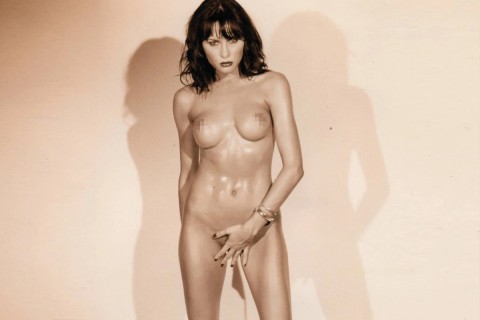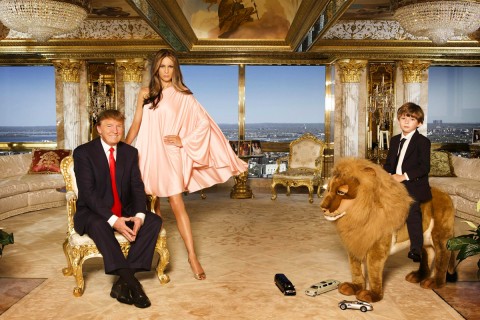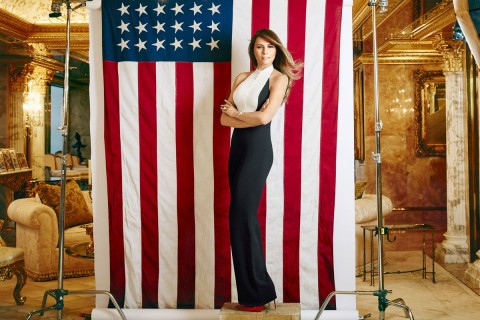I only recently found out that former Gucci creative director and current creative director of Tom Ford, Tom Ford, also happens to be an accomplished filmmaker, which came as a surprise.
I was even more surprised to hear that his films are actually good, rather than banal vanity projects only afforded to him because of his celebrity status, like a certain producer-turned-rapper-turned-fashion designer that comes to mind, if only I could remember his name…
Well, Tom Ford appeared on The View last week to promote his sophomore film, Nocturnal Animals, and was quizzed on whether or not he not he would dress the new First Lady-elect, Melania Trump, if invited to do so. Ford said that he wouldn’t, also highlighting that he has turned her down in the past.
His reasoning wasn’t driven so much by political repulsion (although he did point out that he’s a Democrat and cast his vote for Hillary Clinton, declaring that he’s “very sad” that she didn’t make it into office, so he wasn’t cowering behind a veil of apoliticism) as by aesthetic considerations and a certain ethical sensibility:
“I was asked to dress her quite a few years ago and I declined; she’s not necessarily my image,” he said, continuing that, “even had Hillary won she shouldn’t be wearing my clothes, they’re too expensive…I think the First Lady has to relate to anybody.” Well, as much as a former model and celebrity billionaire’s trophy wife could possibly be mass-relatable.
The reason why this question was even presented to Tom Ford is because it’s an issue that has divided the fashion world.
On November 17, Sophia Theallet, who often provided clothes for Michelle Obama, published an open letter railing against Trump’s hateful brand of politics and urging other fashion designers to join in her own personal boycott of his incoming regime.
Admirably, Theallet put her money where her mouth is, writing “our bottom line is not just about money.” The likes of Marc Jacobs, Philip Lim and Humberto Leon shared similar sentiments, and deserve praise for showing some principle.
Others, like Thom Browne, Tommy Hilfiger, Diane Von Furstenburg, Joseph Altuzzura, and Rag & Bone’s Marcus Wainwright, didn’t. Neatly summarizing the Vichy-levels of indifference that purvey the clothing industry, Caroline Herrera went on record to say: “I think that in two or three months they’ll reach out, because it’s fashion. You’ll see everyone dressing Melania.”
I find this detestable but it’s hardly surprising. Sweatshop labor is a cornerstone of the clothing manufacturing model, and certain subsegments of the industry, like fast-fashion retailers, have built their entire fortunes from human suffering and economic exploitation.
Not that fashion is an exception in this regard: a total absence of conscience purveys nearly the entire world of business. Profit overwhelmingly trumps principles, so bravo to Ford, Theallet, and every other designer that has shown some backbone.
Some would dismiss this as hollow posturing, but I disagree with that sentiment. Sure, its power is negligible when compared to direct political action and civil disobedience, but it’s still an obstacle against the normalization of the Trump regime.
It sends out a clear message that, no, The Donald and his hateful rhetoric are not acceptable, drawing a clear line in the sand that divides those that oppose him and those that support him – either explicitly, like Melania and his surrogates, or tacitly through their indifference, like Carolina Herrera. If you’re not taking a stand against Trump and what he represents, then you’re enabling him by confirming that he can do what he wants without objection or repercussions.

Although individual expressions of dissent means nothing in isolation, if they’re voiced repeatedly, consistently, and loudly by enough people, collectively they become substantive, and glitterati endorsements give them added visibility.
We live in an era where most people are so politically illiterate, so disconnected from current affairs, that they can’t even tell the difference between real or fake news. Popular culture, sadly, reaches far more people than investigative journalism.
Celebrities have always been able to manufacture headlines, but now they can impulsively fart them out through their smartphones with minimal introspection or reasoned thought. Social media allows them to circumvent the traditional media in reaching the masses, and in our interconnected world their platform is arguably bigger than ever before. Social media is reshaping the political landscape, and even orality and literacy on a societal level. The Donald understands this innately, and used it to powerful effect throughout his campaign.
Those that speak out against Trump, like Tom Ford or Marc Jacobs, place the topic in an arena that journalists scarcely reach, nudging their followers into considering their own stance on the reality TV demagogue. Maybe they’ll decide that they prefer Trump over either of them and refuse to buy another Tom Ford fragrance ever again, but, conversely, it could also swing them the other way.

Some would argue that Clinton’s failure has discredited the power of celebrity – after all, just about anyone and everyone who isn’t a total washed-up nobody rallied around the Democrats, first with Bernie Sanders, with many of them converting over to Hillary’s campaign once she clinched her party’s nomination. But yet the combined star appeal of Lady Gaga, Katy Perry, LeBron James and every other famous Clinton surrogate proved impotent against the rage of the disaffected working classes in the Midwest that tipped the electoral college Trump’s way.
I disagree with this reasoning. In fact, I believe that The Donald’s victory is a testament to the overbearing power of fame in modern America. Without The Apprentice, we wouldn’t be in this shameful mess. Through his show, Trump was able to shape his public image as a ruthlessly iron-fisted head of an expansive business empire – one whose unassailable, steely resolve and innate financial wizardry make him uniquely qualified for the presidency. Or so his rabid base would tell you.
It may have been reality television, but there was nothing real about it. It was a scripted and curated version of reality with no relation to fact or truth. The Donald was like the Wizard of Oz, hiding behind his curtain, projecting the image of a giant while desperate contestants scurried around like ants, prostrating themselves in exchange for his mercy.
In actual reality, the reality defined by physics and gravity, he’s just the son of a billionaire who got a big loan from daddy before going bankrupt a few times and relying on the government to bail him out. The only reason he was ever of interest to the public was because of his tabloid marriages to women much more famous than him, but obviously none of this, not even his tiny hands, is visible through the distorted prism of reality television.
The power of celebrity allowed Donald Trump to overcome two political dynasties that have shaped America over the past four decades: the Bushes and the Clintons. He didn’t need a lifetime of public service to build his political platform, because he constructed his image through 14 seasons of The Apprentice.
According to newspaper columnist and cultural critic, Alex Ross, the leftwing thinkers of the Frankfurt School predicted way back in the 1950s that America’s pathological obsession with TV and mass media made it uniquely susceptible to men with fascistic tendencies who might use it as a political platform. In The New Yorker, Ross writes:
“Adorno believed that the greatest danger to American democracy lay in the mass-culture apparatus of film, radio, and television. Indeed, in his view, this apparatus operates in dictatorial fashion even when no dictatorship is in place: it enforces conformity, quiets dissent, mutes thought. Nazi Germany was merely the most extreme case of a late-capitalist condition in which people surrender real intellectual freedom in favor of a sham paradise of personal liberation and comfort.”
And he was right. When you see Michelle Obama singing along to Beyoncé with James Corden on a segment of Carpool Karaoke, or Barack Obama going for coffee with Jerry Seinfeld, you’re not watching a piece of entertainment, you’re being fed propaganda. In exchange for clicks, views and advertising revenue, the Obamas are allowed to shape the way that you perceive them.
They present themselves through the lens of charming, funny, likable people who listen to the same music and enjoy the same comedians that you do, rather than the head of a blood-stained drone program that obliterates innocent children in the Middle East.
It distracts from the fact that the supposedly liberal Obama administration jailed more whistleblowers than the torture-loving crooks in the Bush regime. It’s a free pass to reframing their public image and evading journalistic scrutiny, thereby undermining the fourth estate. This isn’t benign fun content, it’s a danger to democracy, one that Trump has masterfully exploited.
This is why I applaud Tom Ford, Marc Jacobs, Sophia Theallet, and every other public figure – and everyone else – that speaks up against the Trump regime. Words are no substitute for action, but they’re something, which makes them better than nothing. Because the crimes of history don’t just stain the hands of those that perpetrated them, but everyone who tacitly aided and abetted them by staying silent.
The views and opinions expressed in this piece are those solely of the author, and do not necessarily reflect the position of Highsnobiety as a whole.

